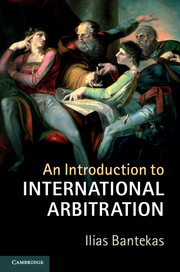Book contents
- Frontmatter
- Epigraph
- Contents
- Preface
- Table of cases
- Table of treaties
- Table of domestic laws
- Institutional Rules and Soft Law
- List of abbreviations
- 1 An introduction to international arbitration
- 2 The laws and rules applicable to arbitration
- 3 The agreement to arbitrate
- 4 The arbitral tribunal
- 5 Arbitration and the courts
- 6 The conduct of arbitral proceedings
- 7 Arbitral awards and challenges against awards
- 8 Recognition and enforcement of arbitral awards
- 9 Consumer and online arbitration
- 10 Investment arbitration
- Index
6 - The conduct of arbitral proceedings
Published online by Cambridge University Press: 05 August 2015
- Frontmatter
- Epigraph
- Contents
- Preface
- Table of cases
- Table of treaties
- Table of domestic laws
- Institutional Rules and Soft Law
- List of abbreviations
- 1 An introduction to international arbitration
- 2 The laws and rules applicable to arbitration
- 3 The agreement to arbitrate
- 4 The arbitral tribunal
- 5 Arbitration and the courts
- 6 The conduct of arbitral proceedings
- 7 Arbitral awards and challenges against awards
- 8 Recognition and enforcement of arbitral awards
- 9 Consumer and online arbitration
- 10 Investment arbitration
- Index
Summary
Introduction
This chapter examines the applicable rules and processes in the conduct of international arbitral proceedings. As the reader will come to realise there are very few elaborate rules as to how arbitral proceedings should be conducted, in contrast to the detailed regulation in respect of ordinary civil proceedings. Given the differences between the major legal systems and the goals of speed, cost-effectiveness and flexibility which arbitration promises to its end users, it is natural that no single model of civil procedure is promoted; whatever the particular attributes of such national models they are generally inflexible and slow. That international arbitration operates successfully in the absence of such predetermined rules (as far as written and oral pleadings are concerned) demonstrates perhaps that the over-regulation of litigation may come at the expense of speed and flexibility, not to mention cost.
Here, we shall examine the foundations of conduct rules, as well as the limitations to party autonomy in designing and enforcing such rules by the parties or arbitral institutions. In this respect, we shall be guided by a variety of soft law instruments that have had a significant impact in addressing gaps and queries often raised by arbitrators and parties. The bulk of the chapter is devoted to understanding current practice in both written pleadings as well as the procedure relevant to oral hearings.
The function of the party autonomy rule
We have already discussed the over-arching significance of party autonomy in relation to the design of the agreement to arbitrate and the use of substantive law chosen by the parties in order to construe their main agreement and their arbitration clause. The voluntary character of arbitration would be seriously undermined if the parties were unable to dictate how arbitral proceedings are to be held and conducted, particularly if deprived of their desire to achieve flexibility and speed. The control of the process is hardly an end to itself. Its purpose is to mitigate the adverse qualities of litigation or ADR and hence ultimately to satisfy the parties’ business demands in a particular case. By way of illustration, if the dispute concerns a sensitive or pressing issue, the parties may well urge the tribunal to resolve the dispute as timely as possible, perhaps through fast-track proceedings.
- Type
- Chapter
- Information
- An Introduction to International Arbitration , pp. 160 - 184Publisher: Cambridge University PressPrint publication year: 2015



